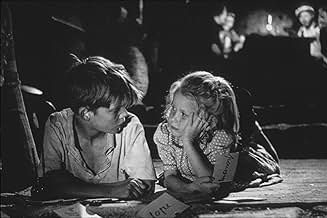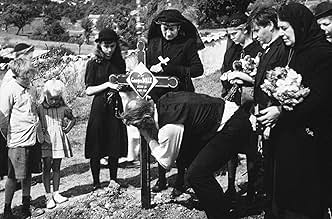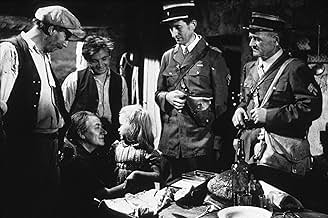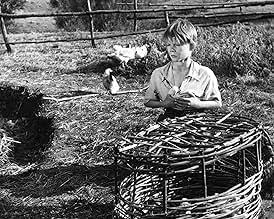VALUTAZIONE IMDb
8,0/10
13.492
LA TUA VALUTAZIONE
Aggiungi una trama nella tua linguaA young French girl orphaned in a German air attack is befriended by the son of a poor farmer, and together they try to come to terms with the realities of death.A young French girl orphaned in a German air attack is befriended by the son of a poor farmer, and together they try to come to terms with the realities of death.A young French girl orphaned in a German air attack is befriended by the son of a poor farmer, and together they try to come to terms with the realities of death.
- Candidato a 1 Oscar
- 8 vittorie e 2 candidature totali
Marcel Mérovée
- Raymond Dollé
- (as Pierre Merovée)
Denise Péronne
- Jeanne Gouard
- (as Denise Perronne)
Marie-Pierre Casey
- Infirmière
- (non citato nei titoli originali)
André Enard
- Le premier gendarme
- (non citato nei titoli originali)
Marcelle Feuillade
- La mère de Paulette
- (non citato nei titoli originali)
Roger Fossey
- Le père de Paulette
- (non citato nei titoli originali)
Trama
Lo sapevi?
- QuizIn a television interview ("Vivement Dimanche Prochain", France 2, 17 April 2005) Brigitte Fossey, who played the little Paulette, revealed that the film had originally been shot as a short, and then it was later decided to extend it into a feature film. Unfortunately she had lost her milk teeth and Georges Poujouly (who plays the boy Michel) had had his hair cut to play in Siamo tutti assassini (1952). So, in many scenes of the movie Paulette has false teeth and Michel is wearing a wig.
- BlooperThe poor parents are killed by a Focke-Wulf 190. This kind of plane didn't exist at the moment of the "battle of France" in May and June 1940.
- Curiosità sui creditiThere are two alternate opening credits:The main credit starts with a story book and a female hand opens the book to reveal the credits. The alternate still has the same book but this time we are introduced to the two main characters who are sitting by a lake. In this version, Michel's hand is turning the page and in between the scenes he tells Paulette that he's going to tell a story.
- ConnessioniFeatured in Le ciné-club de Radio-Canada: Film présenté: Jeux interdits (1959)
Recensione in evidenza
Wonderfully wry, ribald, and ironic look at children, life, and death in the provinces. This must be one of the best examples of poetic realism much better than any Renoir you'll see it's alive and humane, comprising a hundred little iconic cinema moments and several major ones.
A little girl, whose parents are killed in an air-raid at the beginning, wanders into a nearby farm clutching her dead dog and is taken in. She becomes attached to the boy at the farm and they start to expand her dog's grave into a little cemetery of dead animals. There's nothing macabre or sinister about this, nor (as the blurbs maintain) is it particularly a statement about the effect of war on children - it's simply the sort of thing kids might do. When they start pinching crosses from the real cemetery though, they are in for it.
The peasant family are a hoot. The father has a hilarious running feud with his neighbour; the daughter is having an illicit affair with the neighbour's son; the elder son succumbs to a tragi-comic demise after an innocuous accident; the second is a good-natured hick; and the youngest boy gets clouted by his father at every turn ("Take that!", says the father as he smacks him across the head "...and that!" says his sister as she plonks some flowers into his hand). Their every movement is bursting with rough humour and vitality and we are being shown something interesting in every frame. It comes vividly to life, and as an evocation of childhood is up there with Selznick's Tom Sawyer and "Spirit of the Beehive".
Remarkable performances from the two children. There's no sanctimoniousness or even self-awareness to it; Clement got it down and it came out right.
A little girl, whose parents are killed in an air-raid at the beginning, wanders into a nearby farm clutching her dead dog and is taken in. She becomes attached to the boy at the farm and they start to expand her dog's grave into a little cemetery of dead animals. There's nothing macabre or sinister about this, nor (as the blurbs maintain) is it particularly a statement about the effect of war on children - it's simply the sort of thing kids might do. When they start pinching crosses from the real cemetery though, they are in for it.
The peasant family are a hoot. The father has a hilarious running feud with his neighbour; the daughter is having an illicit affair with the neighbour's son; the elder son succumbs to a tragi-comic demise after an innocuous accident; the second is a good-natured hick; and the youngest boy gets clouted by his father at every turn ("Take that!", says the father as he smacks him across the head "...and that!" says his sister as she plonks some flowers into his hand). Their every movement is bursting with rough humour and vitality and we are being shown something interesting in every frame. It comes vividly to life, and as an evocation of childhood is up there with Selznick's Tom Sawyer and "Spirit of the Beehive".
Remarkable performances from the two children. There's no sanctimoniousness or even self-awareness to it; Clement got it down and it came out right.
- federovsky
- 28 apr 2008
- Permalink
I più visti
Accedi per valutare e creare un elenco di titoli salvati per ottenere consigli personalizzati
- How long is Forbidden Games?Powered by Alexa
Dettagli
- Data di uscita
- Paese di origine
- Sito ufficiale
- Lingua
- Celebre anche come
- Forbidden Games
- Luoghi delle riprese
- Aziende produttrici
- Vedi altri crediti dell’azienda su IMDbPro
Botteghino
- Lordo Stati Uniti e Canada
- 19.889 USD
- Fine settimana di apertura Stati Uniti e Canada
- 4.316 USD
- 26 apr 2015
- Lordo in tutto il mondo
- 19.889 USD
- Tempo di esecuzione1 ora 26 minuti
- Colore
- Proporzioni
- 1.37 : 1
Contribuisci a questa pagina
Suggerisci una modifica o aggiungi i contenuti mancanti

Divario superiore
By what name was Giochi proibiti (1952) officially released in India in English?
Rispondi

























